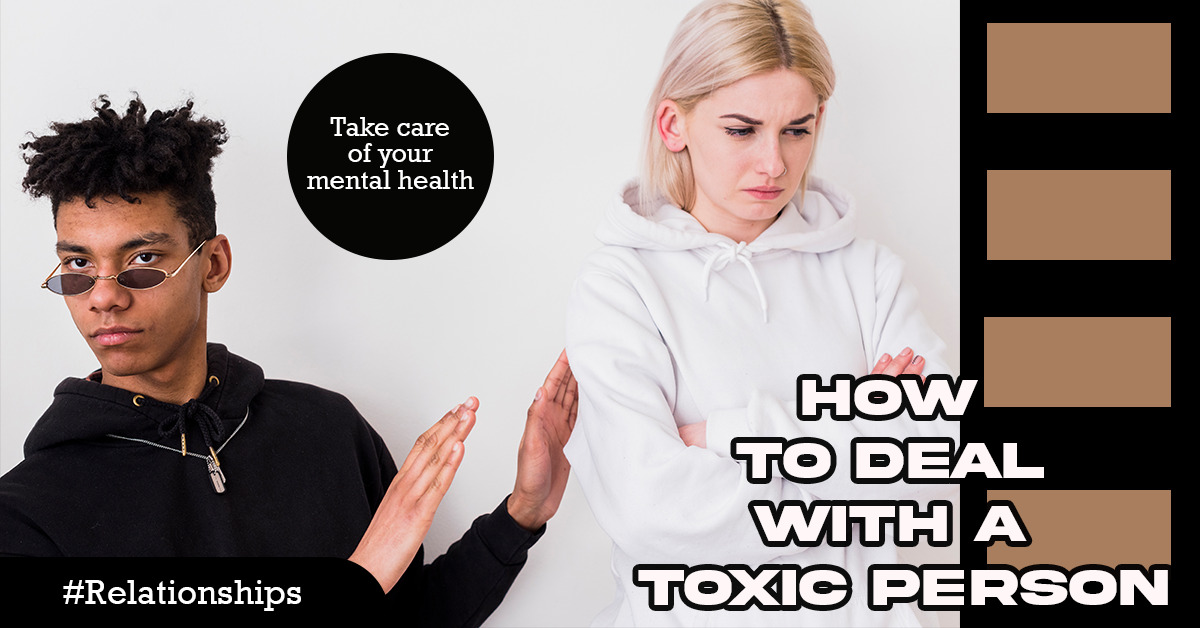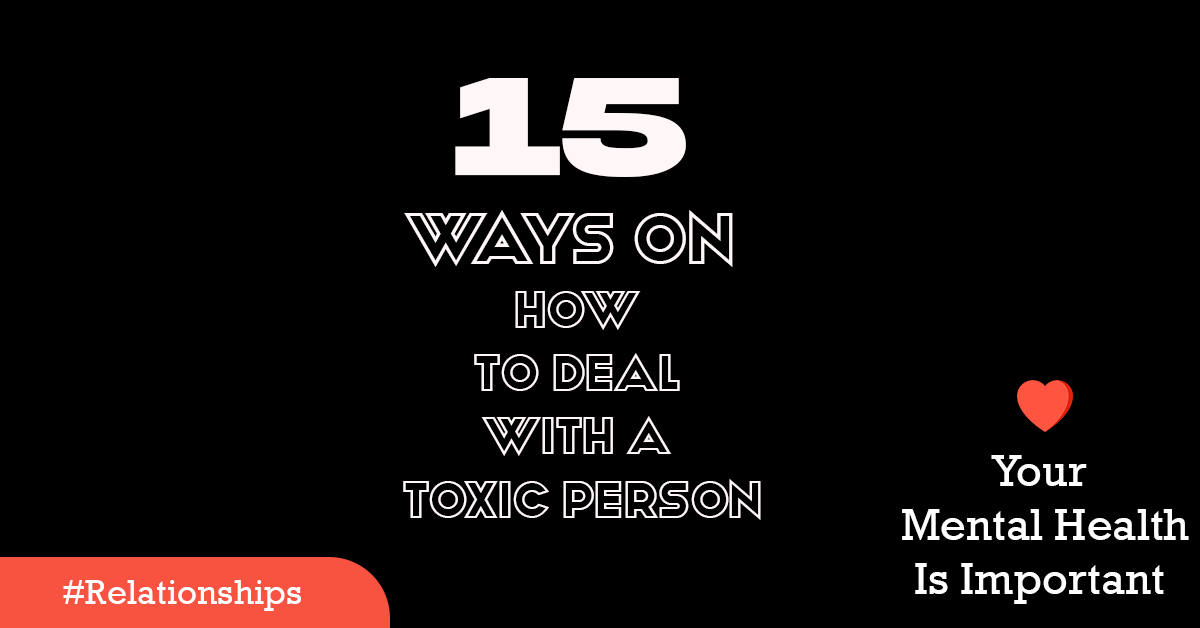How To Deal With A Toxic Person( Step by Step)

How To Deal With A Toxic Person: Everyone is familiar with the individual who makes you feel worse after talking to them. Perhaps it’s a family member who manipulates you or a coworker who constantly complains about everything. These folks are frequently described as toxic. But it’s critical to remember that this phrase lacks a clear definition and is not based in psychology. Instead of just referring to someone as toxic if you’re having trouble working with them, it can be beneficial to identify their harmful habits.EnoughInfo.com

Do you have a particularly hard time getting along with a friend, family member, or romantic partner? Around them, do you feel controlled or degraded? If so, you might be surrounded by poisonous individuals. If you decide to carry on, you must navigate toxic people with extra caution. There are methods you can employ to improve your self-care and interpersonal skills in a toxic relationship. Keep reading.
FAQs & Answers on How To Deal With A Toxic Person
1. How do I deal with a toxic person?
Dealing with a toxic person involves setting firm boundaries, avoiding negative communication and interactions, and focusing on self-care. It’s important to remember that it is not your responsibility to ‘fix’ a toxic person and that the best way to handle them is by creating a safe environment for yourself and limiting contact with them as much as possible. How To Start An Online Business: 11 Steps To Help You Get Started
2. What are some tips on how to respond in situations involving toxic people?
When faced with a toxic individual, it is important to remain calm and composed. Speak gently but firmly and make sure you assert your boundaries clearly while maintaining an open dialogue. It is also important to take care of yourself during the interaction by practicing positive self-talk and reminding yourself of your own worth. If you feel overwhelmed or unsafe it’s okay to distance yourself from the situation or remove yourself altogether until emotions cool down.
3. How can I protect myself from a toxic person?
The best way to protect yourself from a toxic person is by creating healthy boundaries for yourself and limiting contact with them when possible. If you must interact with them, make sure to use assertive language, stay true to your values, maintain an open dialogue without being overly aggressive or confrontational, and practice self-care afterward. Finally, if the relationship becomes too much for you— speak out about the toxicity and make sure you take the time for yourself you need in order to heal from any effects their toxicity may have caused.
How To Deal With A Toxic Person

1. Do not reinforce their reality
Some people have a propensity to always portray themselves as the victim. If they make a mistake, they might assign blame to someone else or make up a tale to cast them in a more favorable light.
You might be tempted to nod and grin to keep your temper in check. Even though it can seem like the safest course of action, doing this might help them regard you as a friend. How To End A Toxic Relationship(Step by Step)
- Instead, try respectfully disagreeing. You may explain what actually occurred and then say, “I had a different take on the matter.” Remain factual and avoid making any false charges.
Although you might disagree with them, doing so might make them less likely to try to involve you again.
2. Keep your distance
It might be demanding to put up with someone’s toxic behavior. The person may continually moan about other people, always have a fresh tale about being treated unfairly, or even accuse you of wronging them or not caring about their needs. How To Make French Toast(Step by Step)
Don’t join in their whining or attempt to defend yourself from charges. Instead, resist the impulse to join in. Say “I’m sorry you feel that way” and leave it at that as an alternative.
3. Consider how you feel when you are around them
You may be able to better navigate interactions with people if you simply become more conscious of how their poisonous conduct affects you. Most people occasionally speak insensitively or hurtfully without intending to. Everyone experiences unpleasant days occasionally, and being angry can cause you to snap. Not always, but it could be harmful.
But consider whether most of your encounters involve insults, deceit, or other forms of verbal or emotional abuse. Do they apologize or show any sign of understanding how their actions or words may be having you? There is no need for you to put up with abuse because of personal difficulties. How to Stop Obsessing Over a Lost Relationship
4. Speak with them regarding their actions
Someone who spreads rumors, misleads people or fabricates dramatic situations might not be aware of the impact of their actions on you or anybody else. A candid discussion could persuade them that their actions are inappropriate. Try to stick to “I statements,” which feel less accusatory to the other person, and establish boundaries that are practical for you in order to maintain objectivity.
The following are some instances of this in action:
- “I find it unsettling to hear disparaging remarks regarding our coworkers. I won’t take part in those discussions.
- If you lie to me once more, I won’t be able to keep this friendship going since I value trust in friendship.
5. Prioritize yourself
On the other hand, behavior can be poisonous without being abusive or vindictive. Other actions could be just as harmful. How To Make Money Without A Job (30 Authentic Ways)
Maybe every time you encounter them, the individual in question “desperately needs” your assistance to get them out of a jam. You feel as though their ability to maintain their emotional stability rests on you because you always give while they constantly take. Even though you may cherish your relationship with this person, don’t put your own health in danger by providing support.
Give and take is a key component of healthy relationships. In other words, you provide assistance while also receiving it. Making good choices for your health entails
6. Show compassion, but avoid attempting to change them
People are capable of changing, but they must be prepared to put in the necessary effort. Instead of fully erasing someone from your life, you might want to lend a hand to someone you care about. You can always show kindness and sympathy, but you probably can’t make people change.
They must resolve to exert the effort at the end of the day. Your emotional reserves may be further depleted if you attempt to change someone before they are ready.
7. Say “no” and then leave
Having trouble saying no to people? It’s not just you. It might be difficult to maintain a refusal, particularly when someone attempts to shame you into altering your opinion. However, if you do choose to answer “No,” don’t change your mind. This could be difficult, especially if they act dramatically to get their way. But the more you do it, the simpler it gets to say “no” to things you don’t feel comfortable with.How To Overcome Jealousy In A Romantic Relationship
You can avoid situations by removing yourself from them. Make it obvious that you’re no longer participating in the conversation if you are unable to depart directly. For instance, say “Excuse me” and walk away.
8. Keep in mind: You are not to blame
Even when you know you didn’t do anything wrong, toxic conduct can make you feel guilty. Being attacked by someone who acts toxically is difficult. They could become personal, try to misinterpret what you said or claim that you’re out to get them. You could even start to doubt yourself at some time and try to think of something you might have done. How To Conduct Market Research( The Ultimate Guide)
But keep in mind that their actions have nothing to do with you. Set clear limits and make an effort not to take their animosity personally. Take a few deep breaths to relax, or pay attention to their words as they are said so you can let them go without being impacted.
7. Avoid being available
Those who behave toxically often detect who they can control. When they realize their strategies don’t work for you, they might leave.
They might eventually quit attempting to engage if you are never available. This tactic can be especially useful at work, since you’re likely to have a ton of sincere justifications, like:
- I’m sorry, but I’m too busy working to chat.
- I have to prepare for the meeting, so I’m unable to speak.
When you offer your excuses, you can encounter some passive-aggressive comments or direct accusations. Even if you are angry, try to hold your tongue. Do not forget: It is not about you.
8. Limit the amount of time you spend together
Do you dread running into a certain person? Feel tense or worried before? Consider these emotions an indication that you might wish to see them less often.
People who engage in harmful behavior frequently prioritize their own needs and desires. They might disregard your feelings or needs and place the blame for any issues they face on you or other people. Spending time with them can be uncomfortable because of this. Consider reducing the amount of time you spend with someone if they frequently step over your limits or pick fights with you.
9. When avoiding the person is impossible
You still have options if you are unable to entirely avoid or reduce the amount of time you spend with someone.
10. Have a backup plan
You could be concerned that leaving sounds impolite if you’re in a poisonous conversation and can’t see a way out, especially if you’re speaking to a supervisor. How To Handle Conflicts In A Relationship(Tips)
But you can certainly go in a respectful manner. If it helps, think about creating a few ready-made sentences that you can use when necessary. Try saying something like, “I apologize, but I must stop you. “Sorry, I’m waiting on an important phone call and can’t go into this right now. I’ve got a lot of work, so I can’t chat right now.”
11. Modify your behavior
Are you constantly interrupted when studying or delayed on your way to work by a family member? Perhaps one of the coworkers often complains during lunch about how poorly everyone treats them.
Ideally, they’d abide by the limitations you impose, but this isn’t always the case. Even if it might not seem fair that you have to alter, it’s frequently worthwhile for your personal wellbeing. You can avoid being drawn into talks you’d prefer avoid by changing up your routine. Consider reading a book, putting on headphones, or eating lunch somewhere other than the break area.
- Family members can be more difficult to avoid. Try addressing the need to concentrate on your schoolwork in a kind but forceful manner. Practice your quick departure plan if you’re about to leave: “Sorry, I’m late!”
12. Set limitations
Limits are necessary. Determining what you will and won’t tolerate is a necessary step in setting boundaries. Maintain these boundaries and make sure they are understood. Perhaps you don’t mind hearing your coworker’s spectacular tales, even those that are blatantly made up. However, you have a limit for verbal abuse or rumors.
Say, “Like I said, I’m not interested in this type of discourse,” when they start making fun of a different coworker. If you can, attempt to leave the room or try wearing headphones.
13. Motivate them to seek assistance
It can be challenging to comprehend why people act in destructive ways. But it could be beneficial to take into account the possibility that they are facing some personal difficulties that are motivating their outbursts. Although it doesn’t excuse bad behavior, this may help to explain it.
If you are in a close relationship with someone who engages in toxic behavior, you might bring up some negative traits and explain how they influence other people (if you feel comfortable doing so). Encourage them to discuss the reasons behind their actions with a therapist if they appear receptive. People can learn to recognize problematic habits through psychotherapy and develop healthy coping mechanisms for their feelings and reactions.
14. Avoid getting personal
Grifting, divulging excessive personal information, or utilizing personal information to elicit responses are all examples of toxic conduct. How To Deal With Anger( The Ultimate Guide)
Keep your interactions light and unimportant if you know someone who engages in these activities. Defend yourself against intrusive questions or excessive disclosure by saying, “Actually, I prefer not to talk about my relationship at work.”
15. Remain composed
You could be perplexed as to how you can maintain composure around the other person when the thought of them makes your heart race.
Try grounding yourself with these strategies the next time you feel nervous during a conversation:
- Deeply inhale and exhale slowly.
- Instead of tensing your muscles, try relaxing them.
- Allow the words to take you in while you silently chant a calming mantra.
- If possible, distract yourself from the circumstance. Draw, fumble with something, or close your eyes and picture the location you like to be.
Conclusion
It may appear that the only option to stop someone’s harmful conduct is to cut them out of your life at times. This, however, isn’t always possible. Remind yourself their actions are not your fault nor your responsibility if you have to spend time with someone who behaves toxically. It’s critical that they are aware of your tolerance limits.
Recommended;
How To End A Toxic Relationship(Step by Step)
How To Overcome Jealousy In A Romantic Relationship
15 Great Ways To Cultivate Compassion( Best Guide 2023)




